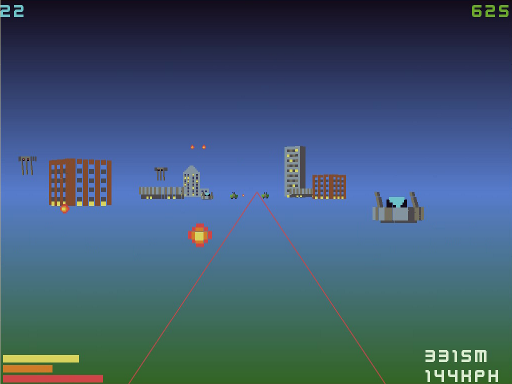Weekly Links #27
I didn't expect to finish my game in just one more week, but here it is. Somehow, in only a few coding sessions, I managed to:
- Add a third enemy and rebalance everything.
- Add sound effects and music.
- Implement the missing help/options screens.
Here's the result. It doesn't look much different, and it's hardly complete; preferences aren't saved, there's no highscore list and there's just one 5-minute level -- which makes it more of a demo. But it feels like a product rather than an experiment, and that's what matters.



And now, for more interesting news.
Very much on topic: over at Rampant Games, Jay Barnson warns about what he calls the idea fairy, and he's right about it too. Luckily for me, I learned long ago to control my scope. For Attack Vector, my largest game so far, I only had to cut a few features such as mines, obstacles and some extra visual fluff. And it still took me a few weeks to make a playable demo. Full games tends to take much longer. Think you'd have the energy to keep it up for nearly two years?
In unrelated news, over at The Escapist, Shamus Young nails what I've been trying to point out for the past half a year: that the industry's sick obsession with new technology and its habit of firing people as soon as they have a little experience make any real progress impossible. And I could launch myself into yet another rant, but instead I'll just remind you that just as movies didn't obsolete books, text adventures are still commercially viable. That they weren't for a while just shows how broken game distribution was before ubiquitous Internet.
Last but not least, Jimmy Maher's history of computer entertainment has reached Ultima IV, and the article states a viewpoint that nowadays seems downright heretical: that while finishing the game is absurdly difficult without help, it hardly matters because that's not the point. Rather, the fun part is losing oneself in that wide
open world. Which seems to jive in an oblique way with this game postmortem, which points out that the core gameplay can be very simple if all the little bits of awesomeness surrounding it make the player want to come back again and again. Makes sense: you can only play the same first person shooter, or match-3 game for that matter, so many times. How it makes you feel makes the difference.
It's a truth I have seen for myself many times. Applying the lesson can be a bit more tricky.